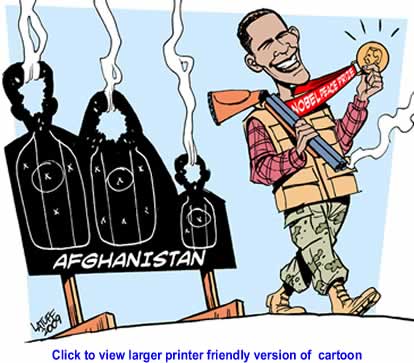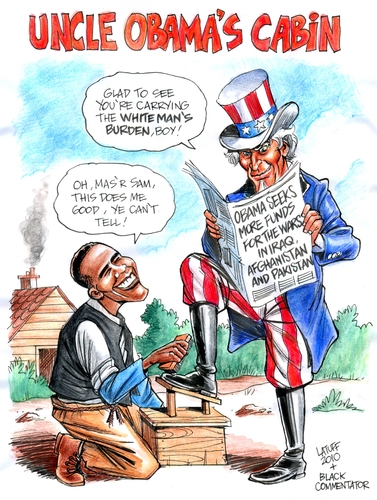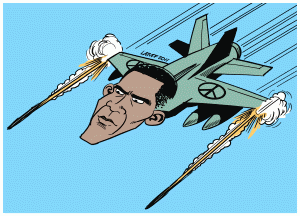
The American president received a tepid response from the assembled heads of state, foreign ministers and UN delegates. Not a single line in his speech evoked applause. The novelty of two years ago, when Obama made his first appearance before the body posing as the champion of multilateral-ism in contrast to Bush, has long since worn off. As the world quickly learned, changing the occupant of the White House did little to shift the direction of American foreign policy or curb the spread of American militarism.
The immediate purpose of Obama's 47-minute address was to supplement a behind-the-scenes campaign of bullying and intimidation aimed at forcing the Palestinian Authority to drop its plan to seek a UN Security Council vote on recognition of Palestine as a sovereign member state.
Washington has vowed to veto any bid for Palestinian statehood if it comes to the Security Council, a move that would only underscore the real character of US imperialist policy in the Middle East and the hypocrisy of its claims to identify with the revolutionary upheavals of the Arab masses.
The speech and Obama's defense of the veto threat served to accomplish the same purpose, further diminishing the US president's popularity in the Arab world. According to a recent poll, his favorable rating in the region has fallen from roughly 50 percent when he took office to barely 10 percent, even lower than George W. Bush in his second term.

Obama rushed from the podium at the General Assembly hall to a meeting and joint appearance with Benyamin Netanyahu. The Israeli prime minister praised Obama's remarks and made it clear that the two are working on a joint strategy to muscle Palestine Authority head Mahmoud Abbas into dropping the statehood bid. It was reported Thursday that there were efforts to get the Palestinian delegation to make an entirely symbolic plea for recognition, while agreeing to postpone any vote until after the resumption of US-brokered negotiations with Israel.
There have been two decades of such talks, which have achieved nothing, while Israel has relentlessly expanded Zionist settlements in the occupied West Bank and Jerusalem. Since the onset of negotiations in 1991, the number of settlers has more than doubled, while the West Bank has been internally divided by settlements, security roads and checkpoints as well as the apartheid security wall separating it from Israel.
Obama's remarks in the UN speech represented an even further accommodation to Israel compared to his proposal in May for a resumption of talks, which he then said should be based upon pre-1967 borders with "mutually agreed swaps." That statement, which implicitly supported Israel's demand to retain existing settlements, merely reiterated the official policy of the US government since the Clinton administration. Nonetheless, the mere reference to borders provoked a storm of criticism from Netanyahu, the Israeli right, and the Republican Party.
In his speech to the UN, Obama mentioned neither the 1967 borders nor any proposal to halt the expansion of settlements on the West Bank. Instead, he presented the basis for proposed negotiations as: "Israelis must know that any agreement provides assurances for their security. Palestinians deserve to know the territorial basis of their state." As the rest of the US president's remarks made clear, both those conditions are to be dictated by Israel.

While behind the scenes US officials are reportedly threatening the Palestinian Authority with cutting off all US aid if it goes ahead with the request for recognition, in his speech Obama described a turn to the UN as a "short cut" that would accomplish nothing.
Dismissing the role of the institution that he had rhetorically praised at the outset of his remarks, Obama said, "Peace will not come through statements and resolutions at the UN—if it were that easy, it would have been accomplished by now." Indeed, scores of UN resolutions on the plight of the Palestinians have been repudiated and ignored by both Israel and Washington. The US has used its veto in the Security Council to kill scores more.
Evidently responding to the right-wing criticism of Republican presidential hopefuls, who have denounced him for "throwing Israel under the bus" with his 1967 borders remark last May, Obama went out of his way to dismiss the historical grievances of the Palestinian people, while identifying unconditionally with Israel.
Of the Palestinians, he said only that they deserved a "sovereign state of their own" and they "have seen that vision delayed for too long."
This was followed by a declaration that "America's commitment to Israel's security is unshakable, and our friendship with Israel is deep and enduring." He continued by describing Israel as a country "surrounded by neighbors that have waged repeated wars against it," whose "citizens have been killed by rockets fired at their houses and suicide bombs on their buses." He referred to Israel as a "small country" in a world "where leaders of much larger nations threaten to wipe it off of the map." And he wound up by invoking the Holocaust.
"These facts cannot be denied," he said. One would never guess from this selection of "facts" that some 4 million Palestinians live under the oppression and constant violence of Israeli occupation, and that another 5 million are refugees, driven from their homeland.
Nor for that matter, would one have any inkling of the constant wars that "little Israel," with its elastic borders, has waged against its neighbors. Among the more recent are the 2006 war against Lebanon, which left 1,200 civilians dead and much of the country's infrastructure in ruins, and the 2008 "Operation Cast Lead," against Gaza, which claimed the lives of nearly 1,500 Palestinians, compared to 13 Israelis.
With a tone of exasperation, Obama acknowledged that "for many in this hall," the Palestinian question was the issue that "stands as a test" for Washington's claims to champion human rights and democracy.
In reality, however, the rest of the speech proved just as revealing in terms of the hypocrisy and imperialist interests that pervade Washington's policies all over the world.
The pretense laid out at the beginning of Obama's speech was that the US government is engaged in "the pursuit of peace in an imperfect world." The address included a trite refrain, repeated three times: "peace is hard."
Fleshing out this theme, Obama pointed to the partial troop withdrawals from the eight-and-a-half-year-old war and occupation in Iraq and the decade-old war in Afghanistan. He bragged that by the end of the year, only 90,000 US troops will be deployed in these wars.
Washington's aim, he said, was to forge an "equal partnership" with Iraq "strengthened by our support for Iraq—for its government and its security forces," and an "enduring partnership" with "the people of Afghanistan." He claimed that these changes proved that "the tide of war is receding."
The rhetoric about "partnership", however, refers to the plans being pursued by the White House and the Pentagon to keep US troops, CIA operatives and American bases in both countries, long past the dates set for US withdrawal. US imperialism is determined to continue pursuing the goals that underlay the wars from the outset: hegemonic control over the strategic energy reserves of the Caspian Basin and the Persian Gulf.
Obama then preceded to extol the "Arab Spring," declaring: "One year ago, the hopes of the people of Tunisia were suppressed…One year ago, Egypt had known one president for nearly thirty years."
Needless to say, the American president made no reference as to whose support had kept the dictators Ben Ali and Mubarak in power for so long, nor to the current attempts by Washington to salvage the regimes they headed and suppress the mass popular movements that forced their ouster.
From there, he proceeded to praise the NATO war in Libya, declaring that, by authorizing this imperialist intervention, "the United Nations lived up to its charter."
In reality, the war represented a fundamental violation of the tenets of this charter, which proclaimed the "sovereign equality" of all member states, demanded that all disputes be settled peacefully and insisted that member states "refrain in their international relations from the threat or use of force against the territorial integrity or political independence of any state."
In the case of Libya, the US and its NATO allies, proclaiming the threat of an imminent massacre in Benghazi, procured a resolution authorizing "all necessary measures" to protect civilians. It utilized this resolution as a cover for a war of regime change. The NATO powers carried out thousands of air strikes and sent in special forces troops to organize, train and arm a "rebel" force for a war that has claimed the lives of tens of thousands of Libyans. The aim of this war, like those in Afghanistan and Iraq before it, is domination of strategic energy reserves—as well as inserting Western military power in the midst of a region facing revolutionary turmoil.
"This is how the international community is supposed to work," Obama declared in relation to the Libyan operation, calling to mind Lenin's description of the League of Nations, the UN's predecessor, as a "thieves' kitchen."
Turning to uncompleted business and potential imperialist interventions yet to come, Obama condemned Iran for failing "to recognize the rights of its own people" and calling for the UN impose new sanctions against Syria. "Will we stand with the Syrian people, or with their oppressors?" he demanded.
Given the bloody events in Yemen, where over 100 civilians have been massacred over the past three days, Obama could not completely ignore the upheavals against US-backed regimes in the region. In Yemen, however, there was no invocation to stand against oppressors, merely a call to "seek a path that allows for a peaceful transition."
Even more tepid was his reference to Bahrain, the headquarters of the US 5th Fleet. "America is a close friend of Bahrain," he declared. Here, where thousands have been killed, tortured, imprisoned, beaten and fired from their jobs for demanding democratic rights, he proposed merely a "meaningful dialogue," while justifying the repression by suggesting that Bahrainis were confronting "sectarian forces that would tear them apart."
The rest of the speech consisted of a hollow and unconvincing recitation of the usual platitudes. These included the elimination of nuclear weapons—with Washington, sitting on the greatest nuclear arsenal in the world and the only state ever to use such weapons lecturing North Korea and Iran. He inveighed against poverty and disease and insisted on the need "not to put off action that a changing climate demands." Thrown in were calls for the rights of women as well as gays and lesbians.
On the decisive issue facing millions of working people in the US and across the globe, Obama acknowledged that economic "recovery is fragile", that "too many people are out of work" and that "too many are struggling to get by." Referring to the multi-trillion-dollar bailout of the banks, he boasted, "We acted together to avert a depression in 2009" and insisted that "We must take urgent and coordinated action once more."
But as with all the other issues raised in the speech, the American president had no "coordinated action," no program, and no policy to propose. In the final analysis, Obama's empty rhetoric is a direct expression of the profound crisis gripping American capitalism and its ruling financial elite as it confronts economic collapse and the threat of revolutionary upheaval.

No comments:
Post a Comment